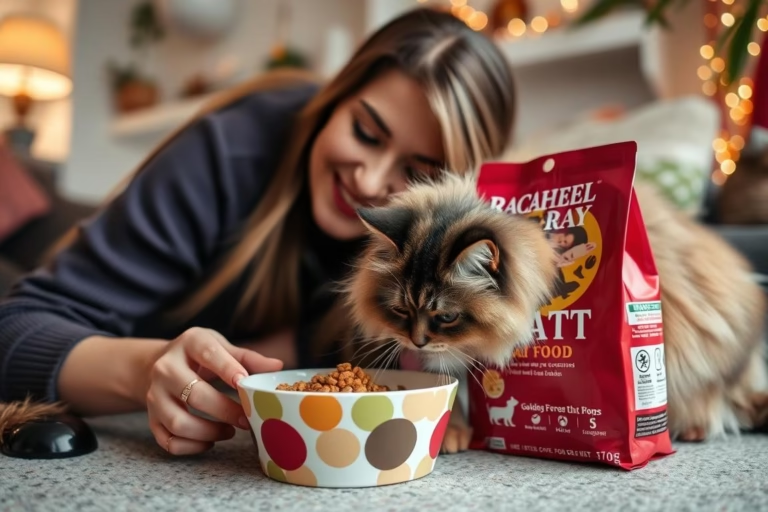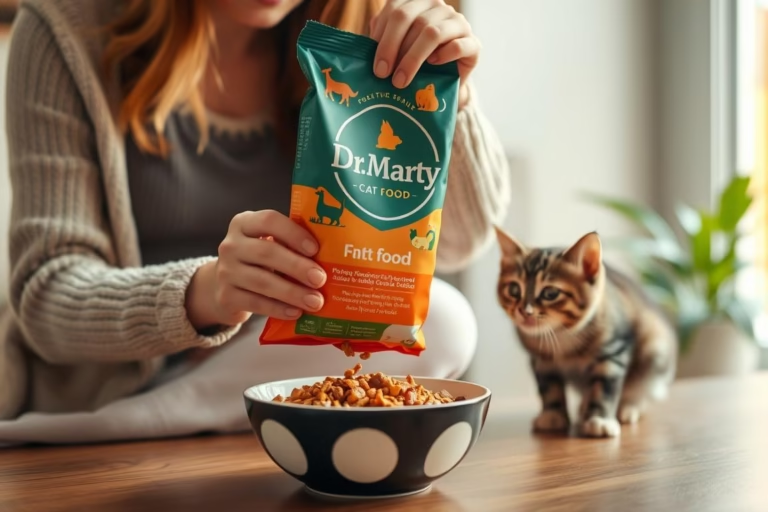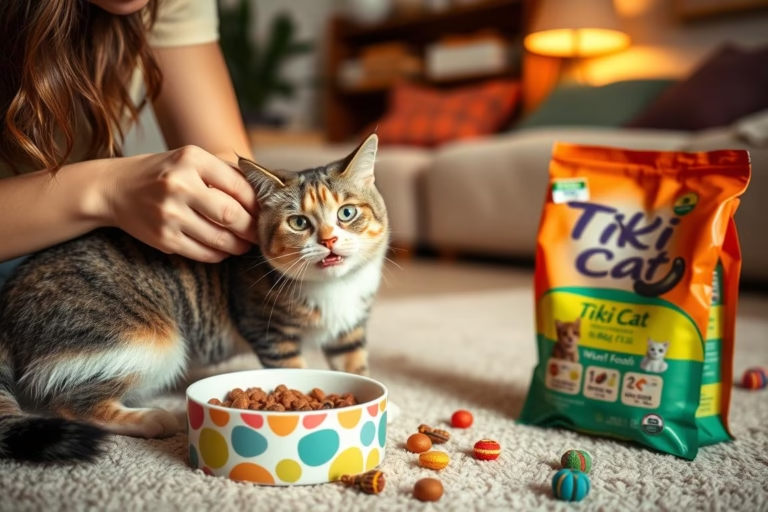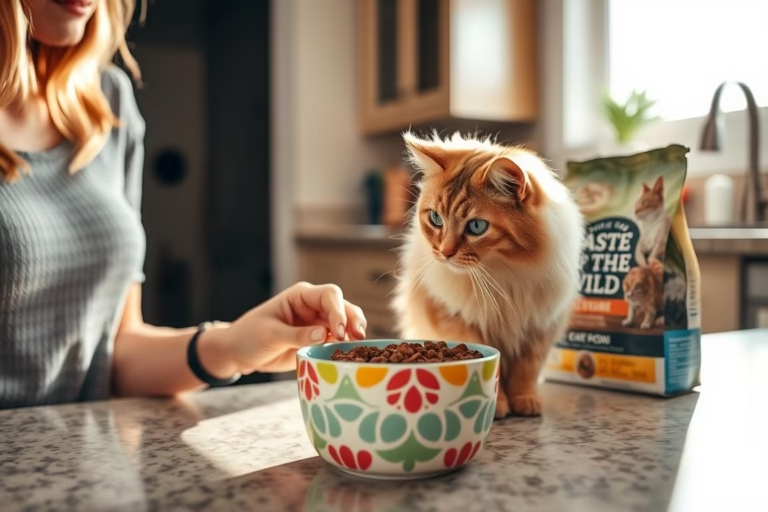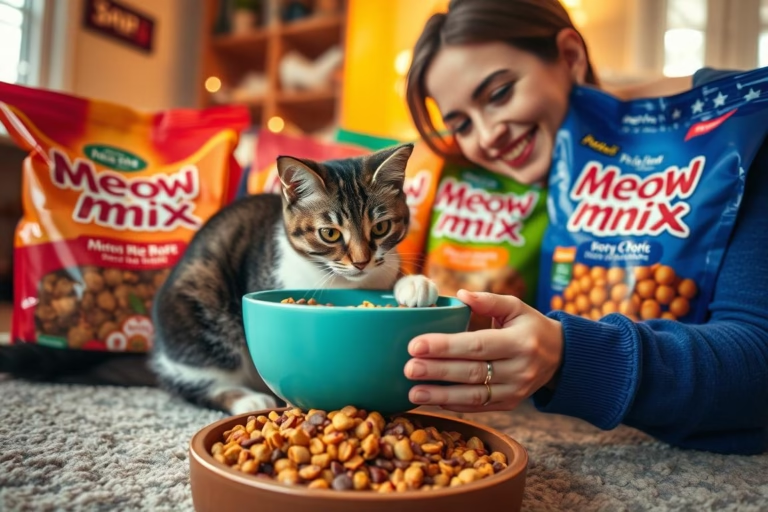Discover Best Cat Food for Sensitive Stomach
Watching your cat struggle with digestive issues is heartbreaking. Cats with sensitive stomachs often vomit or have hairballs. This can upset both you and your pet.
Finding the right cat food for sensitive stomachs is challenging. But don’t worry, we’re here to help. We’ll show you the best cat food for sensitive stomachs. It meets their dietary needs and supports their health.
Choosing the right diet is key, especially when it takes months to see results. Our guide will help you make the best choices for your cat. This ensures they live a happy, healthy life.
For more tips on keeping your cat healthy, check out Pepto-Bismol for Cats.
Table of Contents
Understanding Sensitive Stomach in Cats
A sensitive stomach in cats can be tough for both pets and their owners. Many cats show signs of digestive problems. These signs mean they need special food. Talking to a vet is key to finding the right food for them.
Common Symptoms of Sensitive Stomach
When a cat has a sensitive stomach, owners might see:
- Frequent vomiting
- Loose stools or diarrhea
- Excessive gas
- Reduced appetite
Causes of Sensitive Stomachs in Cats
There are many reasons why a cat’s stomach might be sensitive. Some include:
- Food intolerances or allergies
- Inflammatory bowel disease
- Use of irritating ingredients or additives in food
- Ingredients sourced from unreliable locations, such as China
When to Consult a Veterinarian
If a cat keeps having digestive problems, see a vet. They can help with a special diet or more tests. A vet can suggest the best food to help your cat feel better.
Essential Ingredients for Sensitive Stomach Cat Food
Looking for the right food for your cat with a sensitive stomach is key. Focus on ingredients that help with digestion. Choose a premium cat food with high-quality proteins, digestive aids, and maybe grain-free options for better tolerance.
High-Quality Proteins
Animal proteins are the base of a good cat diet. Chicken, turkey, or fish are great because they have amino acids for growth. They should make up at least 26% to 30% of the food, as AAFCO recommends. Opt for easy-to-digest proteins to avoid stomach problems.
Digestive Aids: Probiotics and Prebiotics
Digestive aids are crucial for a healthy gut. Probiotics and prebiotics help with good bacteria, improving digestion. Choose premium cat food with these ingredients to help digest food better and absorb nutrients.
Grain-Free Options
Grains can upset a cat’s stomach. Grain-free foods are often better tolerated. Look for foods with low carbs, under 10% on a dry matter basis. This can help avoid stomach discomfort. Natural cat food for sensitive stomachs is a good choice for your cat’s health.
| Ingredient Type | Recommendations | Benefits |
|---|---|---|
| High-Quality Proteins | Chicken, Turkey, Fish | Supports muscle health and growth |
| Digestive Aids | Probiotics, Prebiotics | Improves digestion and nutrient absorption |
| Grain-Free Options | Legumes, Potatoes, Peas | Lower risk of digestive upset |
Nutritional Analysis of Cat Food Options
Understanding what your cat eats is key to their health. Look for hypoallergenic cat food that focuses on omega-3 fatty acids and soluble fibers. These help fight inflammation and keep digestion smooth.
Key Nutrients for Sensitive Stomach
When picking food for cats with sensitive stomachs, remember these nutrients:
- Omega-3 Fatty Acids: Good for overall health and cuts down inflammation.
- Soluble Fiber: Helps with digestion and stops constipation.
- High-Quality Protein: Crucial for energy and keeping muscles strong.
Protein and Fat Ratios
The right mix of protein and fat is vital. For example, Hill’s Science Diet Sensitive Stomach has 35% protein and 21.9% fat. This balance is key for a healthy diet.
Dietary Fiber Content
Fiber is important for your cat’s digestive health. Foods like Royal Canin Digestive Care have 44.4% protein, 17.4% fat, and 5.5% fiber. They’re made for cats with sensitive stomachs.
Wet or dry foods with the right moisture level also boost fiber. Wet foods have 75% to 78% moisture, making them easier to digest than dry foods, which have only 10% to 12% moisture.
Benefits of Choosing the Right Cat Food
Choosing the right food is key for cats with sensitive stomachs. The right food boosts their health and happiness. It makes sure they get the nutrients they need.
Improved Digestive Health
Good cat food helps with digestion. It has ingredients that are easy to digest. This reduces stomach problems.
Hill’s Science Diet Sensitive Stomach & Skin is a great example. It’s made for gentle digestion. But, every cat is different, so results can vary.
Increased Energy Levels
Quality food is important for energy. Foods with high-quality proteins, like chicken and salmon, give cats the energy they need. This makes them playful and active.
Reduction in Allergic Reactions
Some cat foods are made to reduce allergies. Brands like Blue Buffalo Sensitive Stomach Chicken Recipe avoid common allergens. This helps keep sensitive cats comfortable.
| Cat Food Brand | Special Features |
|---|---|
| Hill’s Science Diet Sensitive Stomach & Skin | Focus on gentle digestion, suitable for adult cats. |
| Blue Buffalo Sensitive Stomach Chicken Recipe | Free from corn, wheat, and soy; ideal for allergenic cats. |
| Royal Canin Digest Sensitive | Designed for cats aged 1 year and older, available in gravy. |
| Instinct Grain-Free Kitten Wet Food | Real chicken, salmon, and beef liver; no grains or artificial preservatives. |
| Purina One Sensitive Systems Dry Cat Food | Free from corn, soy, and wheat; crafted for easier digestion. |
Choosing the right cat food can make a big difference. It can make your cat more comfortable and happy.
Best Cat Breeds for Sensitive Stomach Food
Some cat breeds are more likely to have sensitive stomachs. This makes choosing the right food very important. The right food can greatly improve their health and happiness. Here are some cat breeds that often need special food for their stomachs.
Siamese and Ragdoll Breeds
Siamese and Ragdoll cats often have sensitive stomachs. They need food that tastes good and is easy on their stomachs. Grain-free foods are a good choice for these cats.
Sphynx and Devon Rex
The Sphynx and Devon Rex breeds are known for their looks but also for stomach issues. They need special diets to stay healthy. Owners should look for foods made for sensitive stomachs to help their digestion.
Persian and British Shorthair Breeds
Persian and British Shorthair cats can also have stomach problems. They do well on diets with high-quality proteins and fewer ingredients. Choose the best cat food for sensitive stomachs that follows AAFCO guidelines for a balanced diet.
How to Read Cat Food Labels Effectively
Learning to read cat food labels is key for picking the right food for sensitive stomachs. Knowing the different parts of the label helps cat owners make better choices for their pets’ diet.
Decoding Ingredient Lists
Ingredient lists are key to knowing if the food is good for your cat. In the USA, the FDA makes sure ingredients are listed in order by weight. Look at the first five to eight ingredients for whole meat sources.
Avoid terms like “animal protein products” because they’re not specific. Choosing high quality cat food helps keep your cat healthy.
Understanding Guaranteed Analysis
The guaranteed analysis section shows the nutrient percentages in the food. For cats, look for amino acids like taurine and arginine. Without them, serious health problems can occur.
This section also checks if the food meets nutritional needs. Check the moisture levels in wet and dry foods to compare nutrients.
Identifying Fillers and By-products
It’s important to spot fillers and by-products in pet food. Ingredients that cause digestive problems should be avoided. High quality cat food should focus on nutrition, not fillers.
Stay away from toxic ingredients like onions, garlic, and chocolate. If unsure, ask a vet for advice on diets.
For more on safe ingredients and diets, check this useful resource. Using these tips ensures your cat gets the best nutrition for their sensitive stomach.
Recommended Brands for Sensitive Stomach Cat Food
Finding the right food for cats with sensitive stomachs is key to their health. Several brands offer top-notch formulas for these cats. Here are some vet recommended cat food for sensitive stomach options that get great reviews.
Hill’s Science Diet Sensitive Stomach
Hill’s has a special formula for cats with digestive problems. It’s made with easy-to-digest ingredients and has prebiotics for a healthy gut. They also have a line for senior cats, meeting their special needs.
Royal Canin Veterinary Diet
Royal Canin focuses on digestion with its sensitive stomach diet. This wet food is high in protein and great for cats over one year old. It helps with nutrient absorption and reduces stomach issues.
Blue Buffalo Basics
Blue Buffalo Basics is a top choice for sensitive stomachs. It uses a simple ingredient list to avoid allergies. It also has omega-3 fatty acids for health.
| Brand | Type | Key Features | Price Range |
|---|---|---|---|
| Hill’s Science Diet | Dry/Wet | Easily digestible, prebiotics | $$$ |
| Royal Canin Veterinary Diet | Wet | Designed for digestion issues | $$$$ |
| Blue Buffalo Basics | Dry/Wet | Limited ingredient, omega-3 fatty acids | $$$ |
For cats with sensitive stomachs, these brands are top picks. Trying these top-rated cat food for sensitive stomach options can make a big difference in their health and happiness.
Comparing Top Brands for Sensitive Stomachs
Finding the right cat food for sensitive stomachs can be tough. There are many choices out there. By comparing top brands, cat owners can make better choices. They can look at nutritional value, price, and what other customers say.
This section will focus on key brands. We’ll look at what they offer. This way, cats with sensitive stomachs can get the best food.
Side-by-Side Brand Comparison
| Brand | Highlights | Suitable For |
|---|---|---|
| Smalls | Fresh, human-grade ingredients, options like Smooth Fish and Smooth Cow | All ages |
| JustFoodForCats | High moisture content, real wild-caught cod, grain-free | Older cats |
| Made by Nacho | Includes prebiotics and probiotics, made with bone broth, turkey, and chicken fat | Picky eaters |
| Miracle Vet | Natural, minimally processed, suitable for kittens as young as four weeks | Kittens |
| Hill’s Prescription Diet | Multiple sources of fiber for improved digestive health, requires prescription | Adult cats |
Price Range Analysis
The cost of good cat food for sensitive stomachs varies. Fresh or specialty foods like Smalls and JustFoodForCats are often more expensive. They cost between $2 to $6 per serving because of their high-quality ingredients.
On the other hand, prescription diets like Hill’s are usually priced similarly. But they might be cheaper because of their larger sizes.
Customer Satisfaction Ratings
- Smalls: 4.8 out of 5 – Highly praised for its fresh ingredients.
- JustFoodForCats: 4.7 out of 5 – Valued for its moisture content and palatability.
- Made by Nacho: 4.6 out of 5 – Often recommended for picky eaters.
- Miracle Vet: 4.5 out of 5 – Loved by kitten owners for its ease of use.
- Hill’s Prescription Diet: 4.4 out of 5 – Trusted by veterinarians for digestive health.
Dosage Chart Based on Breed Size and Age
Feeding your cat the right food is key. It depends on their age and size. The right amount helps them stay healthy. Here’s a guide for kittens, adult cats, and seniors.
Kittens: Nutritional Guidelines
Kittens grow fast and need lots of protein and energy. They should eat kitten food, like Royal Canin. Start new foods slowly to avoid upset stomachs.
Don’t give them cow’s or goat’s milk. It can upset their stomach. Kittens do best with a mix of wet and dry food.
Adult Cats: Portion Control
Adult cats need balanced food. It’s important to control their portions to keep them from getting too fat. The best food for sensitive stomachs has a clear guide for feeding based on their weight and activity level.
This ensures they get the right amount of nutrients. It helps them stay healthy for a long time.
Senior Cats: Adjusting Food Intake
Senior cats have different needs as they age. They need food that’s easy to digest and packed with nutrients. Look for foods made for seniors.
Watch for changes in their eating habits. They might need a calm place to eat. Their preferences can change as they get older.
| Age Group | Food Type | Portion Size (Approx.) |
|---|---|---|
| Kittens | Wet & Dry Mix | 1/3 to 1 cup daily, divided into 3-4 meals |
| Adult Cats | High-Quality Dry Food | 1/2 to 1 cup daily, based on weight |
| Senior Cats | Senior Formulas | 1/4 to 1/2 cup daily, depending on weight |
Make mealtime peaceful for your cat. This helps their digestion. Keep their food and water bowls clean and away from litter boxes. For more tips, check out Pet World GDL.
Expert Reviews on Sensitive Stomach Cat Food
Experts are key in finding the best food for cats with stomach issues. This section looks at ratings, feedback, and health gains from vet-recommended cat food. It helps you choose the best for your cat.
Overall Ratings and Feedback
Many cat owners see big improvements in their pets’ health with the right food. Royal Canin and Hill’s Science Diet top the list for sensitive stomachs. Owners praise the quality and how it makes their cats feel better.
Taste Test Results
Some foods are clear winners in taste tests. Merrick Limited Ingredient Diet and Purina ONE are favorites. They’re loved for their flavor, showing cats enjoy eating while staying healthy.
Long-term Health Improvements
Switching to special diets can lead to lasting health gains. Hill’s Prescription Diet and Smalls Fresh Cat Food Subscription are big winners. They improve skin, coat, and energy, and reduce stomach problems.
| Cat Food Brand | Protein (%) | Fat (%) | Fiber (%) | Calories per Can/Cup |
|---|---|---|---|---|
| Royal Canin Digestive Care | 44.4 | 17.4 | 5.5 | 66 kcal/3 oz |
| Merrick Limited Ingredient Diet | 36.4 | 27.7 | 6.4 | 183 kcal/5 oz |
| Purina One +Plus Sensitive Skin | 34.0 | 14.0 | 4.0 | 429 kcal/cup |
| Hill’s Science Diet Adult | 35.0 | 21.9 | 1.1 | 507 kcal/cup |
| Purina ONE Sensitive Stomach | 34.0 | 13.0 | 4.0 | 421 kcal/cup |
| Hill’s Prescription Diet | 29.0 | 10.5 | 4.5 | 400 kcal/cup |
| Merrick Purrfect Bistro | 34.0 | 16.0 | 2.5 | 400 kcal/cup |
Adding Supplements to Your Cat’s Diet
Adding supplements to your cat’s diet can boost their health, especially if they have sensitive stomachs. Always talk to a vet before adding any supplements. This ensures they are safe and work well. A good diet, like high quality cat food for sensitive stomach, can also benefit from the right supplements.
When to Consider Supplements
Knowing when to add supplements is key. If your cat still has digestive issues even with good food, it’s time to think about supplements. Signs like changes in appetite, coat, or energy levels mean they might need extra help.
Safe Options for Sensitive Stomachs
There are safe supplements for cats with sensitive stomachs. Here are some:
- Digestive Enzymes: They help break down food better.
- Probiotics: They keep the gut healthy and balanced.
- Omega Fatty Acids: Good for skin and coat health.
- Multivitamins: They make sure your cat gets all the nutrients they need.
These supplements can help with a diet of high quality cat food for sensitive stomach. They address specific health needs.
Monitoring Your Cat’s Health
Watch your cat’s health closely after adding supplements. Look for any good changes or bad reactions. Regular vet visits are important to see if the supplements are working. They can also help manage any issues with the cat food.
For more detailed advice, check out specific supplement recommendations.
| Supplement | Benefits | Recommended For |
|---|---|---|
| Digestive Enzymes | Improved digestion and nutrient absorption | Cats with dietary sensitivities |
| Probiotics | Enhanced gut health | Cats with recurrent digestive issues |
| Omega Fatty Acids | Healthier skin and shiny coat | Cats with dry skin or coat problems |
| Multivitamins | Balances nutritional gaps | Cats on limited or specialized diets |
Transitioning to New Cat Food
Changing your cat’s food needs careful planning to avoid upset stomachs. A smooth transition helps your cat accept the new food and keeps their digestive system healthy. Knowing how to transition well is key, especially for cats with sensitive stomachs.
Step-by-Step Transition Guide
Transition to new cat food over 1-2 weeks, adjusting for wet or dry food changes. Start by mixing a small amount of new food with their current food. Increase the new food each day. Here’s a suggested transition timeline:
| Day | Old Food | New Food |
|---|---|---|
| 1-3 | 75% | 25% |
| 4-6 | 50% | 50% |
| 7-9 | 25% | 75% |
| 10+ | 0% | 100% |
Watch for signs of food intolerance during the transition. If your cat won’t eat for more than 24 hours, see your vet.
Recognizing Signs of Food Intolerance
Watch for vomiting, diarrhea, or hairballs, signs of a sensitive stomach. If you see these, the new food might not be right. Always talk to your vet about any ongoing issues. They can suggest the best diet for your cat.
Ensuring a Smooth Changeover
Feed your cat at the same times every day. Remove uneaten food after 20-30 minutes. Play with your cat for 15-20 minutes before meals to help them eat.
Choose high-quality, single-source protein foods to reduce allergens. Foods rich in probiotics and prebiotics support digestion. Opt for holistic and natural foods without artificial additives.
Homemade Solutions for Sensitive Stomachs
For cat owners looking for alternatives, homemade food is a great option. It lets you control what your cat eats, making sure it’s safe and healthy. It’s key to add important nutrients while being careful to keep your cat safe.
Simple Recipes to Try
- Chicken and Rice Stew: Boil chicken breasts and mix them with cooked rice and carrots. This simple recipe is gentle on digestion.
- Pumpkin and Turkey Mix: Combine ground turkey with canned pumpkin and a little water for extra moisture. This combo promotes digestive health.
- Salmon and Sweet Potato Dish: Bake salmon and serve it with mashed sweet potatoes. Rich in omega-3 fatty acids, this dish is great for sensitive stomachs.
Important Nutrients to Include
Feeding your cat the right foods can really help their digestion. Make sure to include:
- High-quality protein sources, avoiding common allergens like beef and fish.
- Soluble fiber to assist digestion and manage hairball issues.
- Antioxidant vitamins to support overall immune health.
Safety Precautions
When making natural cat food, safety is the top priority. Here’s what to do:
- Ensure all ingredients are fresh and free from mold or spoilage.
- Introduce new recipes gradually to monitor for any adverse reactions.
- Consult with a veterinarian to ensure the diet meets all nutritional requirements.
Common Myths about Cat Food Ingredients
Many myths surround cat food ingredients, especially for cats with sensitive stomachs. Knowing these myths helps you make better choices for your cat. This is especially true when looking for the best cat food for cats with sensitive stomachs.
Debunking Misconceptions
Some cat owners think grain-free diets are always best for their pets, especially if they have digestive issues. But, removing grains from cat food isn’t always needed. Grains like rice, corn, and wheat might cause allergies in some cats. However, they’re not bad for all cats.
The FDA has found a link between grain-free diets and heart problems in dogs. So, many food makers have started adding grains back into their products.
The Truth About Grain-Free Diets
Grain-free cat food is often seen as better, but it’s not the only thing that matters. A balanced diet gives cats the nutrients they need, not just what’s missing. Cats don’t need as many carbs as dogs do, and too much can cause health problems.
Most good pet foods, including grain-free ones, are tested to make sure they have the right vitamins, minerals, and proteins.
Understanding Raw Diets for Cats
Some people think raw diets are natural and good for pets. But, there are risks to consider. Raw meat can have harmful bacteria, like E. coli and Salmonella.
Also, too much protein can be hard on a cat’s kidneys, especially for older or less active cats. Choosing the right cat food means focusing on safety and nutrition, not just trendy diets.
Conclusion: Choosing the Best Food for Your Cat
It’s important to know what your cat needs in their diet, especially if they have a sensitive stomach. The right food can make a big difference in their health and happiness. There are many products on the market that are good for sensitive stomachs, and both vets and cat owners agree.
Recap of Key Points
We talked about how to pick the best food for cats with sensitive stomachs. We looked at important ingredients, nutritional values, and top brands. Many cat owners have seen big improvements in their pets’ digestion and mood after switching to the right food. Brands like Natural Balance L.I.D. Limited Ingredient Diets and Hill’s Science Diet Sensitive Stomach & Skin are great choices.
Final Recommendations
Choosing foods without fillers and with high-quality proteins like chicken or fish helps with digestion. Adding wet food can also help because it’s moist and has enzymes. Merrick’s and Royal Canin Digestive Care are good examples of foods that use quality ingredients. Always watch how your cat reacts to new foods.
Encouragement for Cat Owners
Keep an eye on what your cat eats. Kittens need more protein, and older cats need food that helps their joints. Understanding their needs can make them happier and healthier. Talking to other cat owners and sharing experiences can help you learn more about caring for cats with sensitive stomachs.
| Brand | Main Benefit | Protein Source |
|---|---|---|
| Nutral Balance L.I.D. | Limited ingredients, ideal for sensitivities | Chicken |
| Hill’s Science Diet | Gentle on stomach, skin benefits | Chicken |
| Royal Canin Digestive Care | Highly digestible proteins | Turkey |
| Merrick | Commitment to quality | Beef |
| Blue Buffalo Sensitive Stomach | Supports digestive health | Salmon |
| Iams | Focus on digestive health | Fish |
Call to Action
As we reach the end of this journey, it’s time to take action for your pets. Join our community to get tips on premium cat food for sensitive stomachs. You’ll connect with other cat lovers who share their experiences to help your pet’s diet.
Join the Community for More Tips
Being part of our community gives you key info on cat food for sensitive stomachs. You’ll meet other cat owners who are passionate about their pets’ health. Together, you can share ideas and support each other in improving your cat’s nutrition.
Share Your Experiences
Your experiences are very important! By sharing them, you help others who have cats with sensitive stomachs. Your tips on food changes or favorite recipes could be exactly what another cat owner needs.
Sign Up for Updates
Don’t miss out on staying updated. Sign up for the latest on premium cat food for sensitive stomachs. You’ll get the newest nutrition tips, expert advice, and product reviews to keep your cat happy and healthy.


